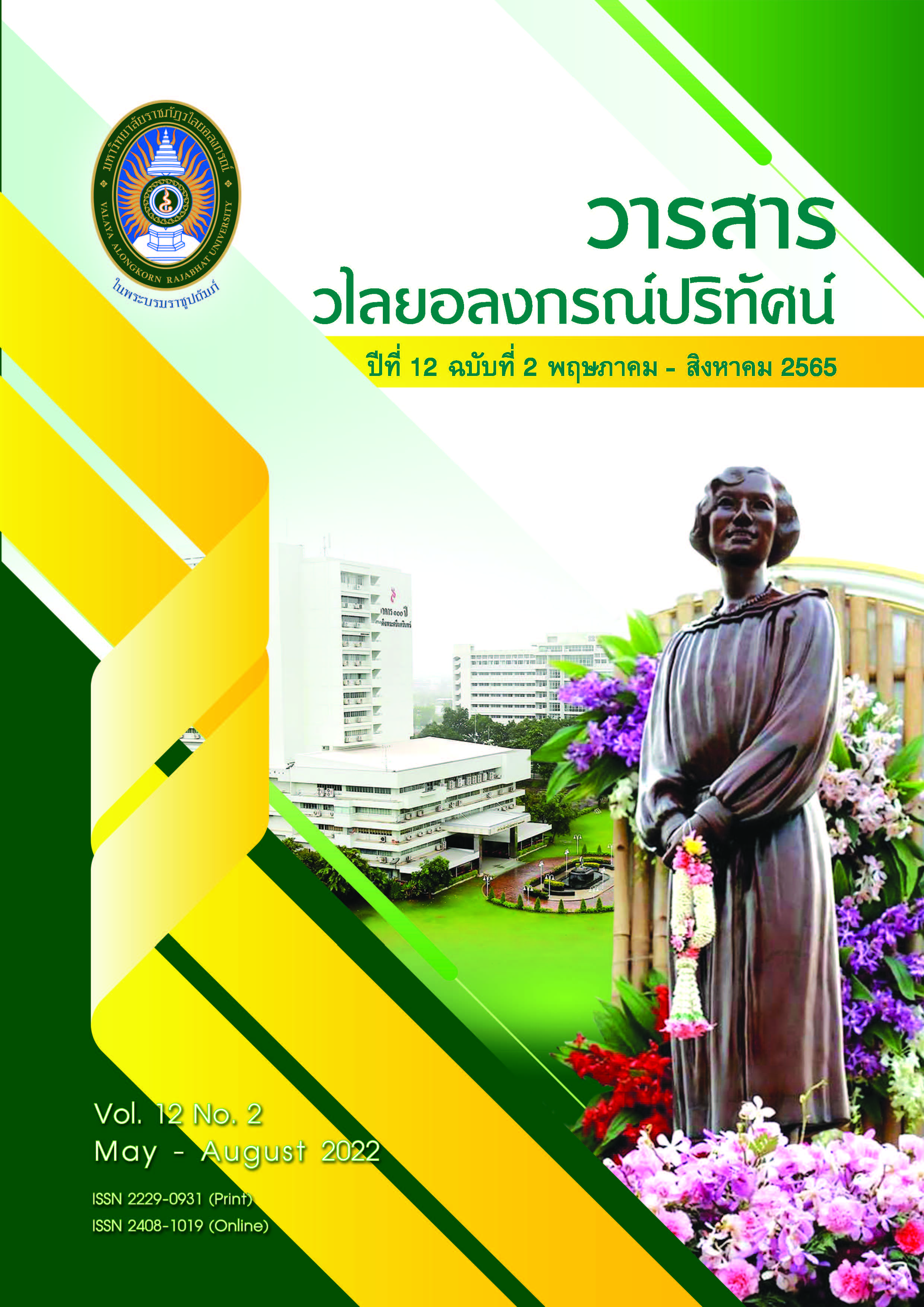การประเมินหลักสูตรศึกษาศาสตรมหาบัณฑิต สาขาวิชาการบริหารการศึกษา คณะศึกษาศาสตร์ มหาวิทยาลัยรามคำแหง
คำสำคัญ:
การประเมินหลักสูตร, หลักสูตรศึกษาศาสตรมหาบัณฑิต, การบริหารการศึกษาบทคัดย่อ
การวิจัยนี้มีวัตถุประสงค์เพื่อ 1) ประเมินบริบทของหลักสูตรในด้านปรัชญาของหลักสูตร วัตถุประสงค์ของหลักสูตร องค์ประกอบของหลักสูตร และรายวิชาของหลักสูตร 2) ประเมินปัจจัยนำเข้าของหลักสูตรในด้านอาจารย์ ด้านคุณลักษณะนักศึกษา และด้านปัจจัยเอื้อต่อการจัดการเรียนการสอน 3) เพื่อประเมินกระบวนการของหลักสูตรในการบริหารหลักสูตร และการจัดการเรียนการสอน การวัดและประเมินผล และการฝึกประสบการณ์วิชาชีพทางการบริหารการศึกษา 4) เพื่อประเมินผลผลิตของหลักสูตรในคุณลักษณะทางวิชาชีพตามอัตลักษณ์มหาวิทยาลัย และ 5) เพื่อประเมินผลกระทบของหลักสูตรในด้านความรู้ความสามารถของมหาบัณฑิตและการปฏิบัติตน โดยผู้วิจัยใช้แบบจำลองการประเมิน CIPPi Model กลุ่มตัวอย่างที่ใช้ในการวิจัยประกอบด้วย อาจารย์ประจำหลักสูตร จำนวน 4 คน นักศึกษาปัจจุบันจำนวน 92 คน มหาบัณฑิตที่สำเร็จการศึกษา จำนวน 92 คน และผู้ใช้บัณฑิต จำนวน 65 คน รวมจำนวนทั้งสิ้น 253 คน เครื่องมือที่ใช้ในการวิจัยประกอบด้วย แบบสัมภาษณ์และแบบสอบถาม โดยรวบรวมข้อมูลระหว่างเดือนมกราคม 2564 การวิเคราะห์ข้อมูลใช้สถิติร้อยละ ค่าเฉลี่ย ค่าเบี่ยงเบนมาตรฐาน และการวิเคราะห์เนื้อหา
ผลการวิจัยพบว่า
1. ผลการประเมินบริบทของหลักสูตร ในด้านปรัชญาของหลักสูตร วัตถุประสงค์ของหลักสูตร องค์ประกอบของหลักสูตร และรายวิชาของหลักสูตรมีความเหมาะสมอยู่ในระดับมากที่สุด
2. ผลการประเมินปัจจัยนำเข้าของหลักสูตร ในด้านอาจารย์ ด้านคุณลักษณะนักศึกษา และด้านปัจจัยเอื้อต่อการจัดการเรียนการสอนอยู่ในระดับมากที่สุด
3. ผลการประเมินกระบวนการของหลักสูตร ในการบริหารหลักสูตร และการจัดการเรียนการสอน การวัดและประเมินผล และการฝึกประสบการณ์วิชาชีพทางการบริหารการศึกษาอยู่ในระดับมากที่สุด
4. ผลการประเมินผลผลิตของหลักสูตรในคุณลักษณะทางวิชาชีพตามอัตลักษณ์มหาวิทยาลัยอยู่ในระดับมากที่สุด
5. ผลการประเมินผลกระทบของหลักสูตรในด้านความรู้ความสามารถของมหาบัณฑิตและการปฏิบัติตนอยู่ในระดับมากที่สุด
เอกสารอ้างอิง
จิราภรณ์ เหมพันธ์. (2561). การประเมินหลักสูตรครุศาสตรมหาบัณฑิต สาขาวิชาการพัฒนาหลักสูตรและการเรียนการสอน ฉบับปรับปรุง พ.ศ. 2556 โดยใช้รูปแบบซิปป์. วารสารนาคบุตรปริทรรศน์ มหาวิทยาลัยราชภัฏนครศรีธรรมราช. 10(พิเศษ) 213-221.
เชษฐภูมิ วรรณไพศาล. (2562). การประเมินหลักสูตรปรัชญาดุษฎีบัณฑิต สาขาวิชาการศึกษาวิชาเอกสังคมศึกษา (หลักสูตรปรับปรุง พ.ศ. 2557) คณะศึกษาศาสตร์ มหาวิทยาลัยเชียงใหม่. วารสารศึกษาศาสตร์ มหาวิทยาลัยมหาสารคาม. 13(2): 122-135.
ธัชชัย จิตรนันท์ และจิราพร วิชระโภชน์. (2558). การประเมินหลักสูตรการศึกษามหาบัณฑิต สาขาวิชาการบริหารการศึกษา (หลักสูตรปรับปรุง 2554) คณะศึกษาศาสตร์ มหาวิทยาลัยมหาสารคาม โดยใช้รูปแบบการประเมิน CIPP Model. วารสารศึกษาศาสตร์ มหาวิทยาลัยมหาสารคาม. 7(1): 95-108.
มาเรียม นิลพันธุ์. (2555). การประเมินหลักสูตรศึกษาศาสตรมหาบัณฑิต สาขาวิชาหลักสูตรและการนิเทศ คณะศึกษาศาสตร์ มหาวิทยาลัยศิลปากร. คณะศึกษาศาสตร์ มหาวิทยาลัยศิลปากร.
มาเรียม นิลพันธุ์. (2557). วิธีวิจัยทางการศึกษา. (พิมพ์ครั้งที่ 8). นครปฐม: ศูนย์วิจัยพัฒนาทางการศึกษามหาวิทยาลัยศิลปากร.
สนิท พาราษฎร์. (2559). การประเมินหลักสูตรวิทยาศาสตรบัณฑิต สาขาวิชาออกแบบผลิตภัณฑ์อุตสาหกรรม (หลักสูตรปรับปรุง พ.ศ. 2555) มหาวิทยาลัยราชภัฏบุรีรัมย์. วิทยานิพนธ์หลักสูตรครุศาสตรมหาบัณฑิต สาขาวิชาหลักสูตรและการจัดการเรียนรู้ คณะครุศาสตร์ มหาวิทยาลัยราชภัฏบุรีรัมย์.
สำเริง อ่อนสัมพันธุ์. (2560). การประเมินหลักสูตรศึกษาศาสตรมหาบัณฑิต สาขาวิชาการบริหารการศึกษา คณะศึกษาศาสตร์ มหาวิทยาลัยศิลปากร. วารสารศิลปากรศึกษาศาสตร์วิจัย. 19(1): 12-27.
สำนักงานคณะกรรมการพัฒนาการเศรษฐกิจและสังคมแห่งชาติ. (2561). ยุทธศาสตร์ชาติ พ.ศ. 2561-2580 (ฉบับประกาศราชกิจานุเบกษา). กรุงเทพมหานคร:สำนักงานคณะกรรมการพัฒนาการเศรษฐกิจและสังคมแห่งชาติ.
สำนักงานคณะกรรมการการอุดมศึกษา. (2558). เกณฑ์มาตรฐานหลักสูตรระดับอุดมศึกษา พ.ศ. 2558 และเกณฑ์มาตรฐานที่เกี่ยวข้อง. กรุงเทพฯ: วงศ์สว่างพับลิชชิ่ง แอนด์ พริ้นติ้ง.
Cohen, Louis. Lawrence, Manion. & Keith Morrison. (2011). Research Methods in Education. (7th ed). New York: Routledge.
Stufflebeam, D. L. & Shinkfield, A. J. (2007). Evaluation theory, models and Applications. CA: Jossey-Bass.
ดาวน์โหลด
เผยแพร่แล้ว
รูปแบบการอ้างอิง
ฉบับ
ประเภทบทความ
สัญญาอนุญาต
ลิขสิทธิ์ (c) 2022 กัลยมน อินทุสุต, สุภาวดี ลาภเจริญ, ศิริพงษ์ เศาภายน, ปทุมพร เปียถนอม

อนุญาตภายใต้เงื่อนไข Creative Commons Attribution-NonCommercial-NoDerivatives 4.0 International License.
ข้อความที่ปรากฏในบทความแต่ละเรื่องในวารสารวไลยอลงกรณ์ปริทัศน์ เป็นความคิดเห็นของผู้นิพนธ์แต่ละท่าน มิใช่เป็นทัศนะและมิใช่ความรับผิดชอบของกองบรรณาธิการจัดทำวารสาร และ
มหาวิทยาลัยราชภัฏวไลยอลงกรณ์ ในพระบรมราชูปถัมภ์


